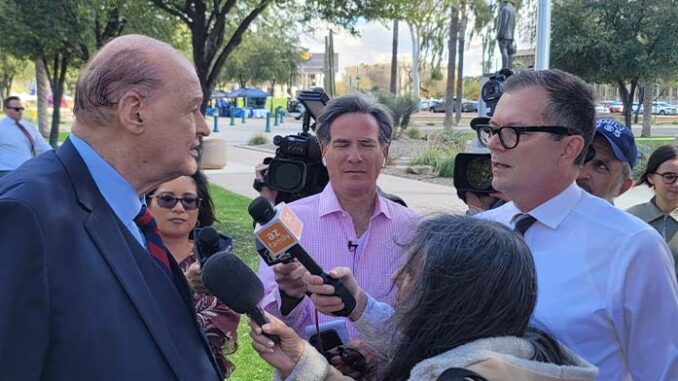
On March 1, the Arizona Auditor General found that in fiscal year 2022, state-wide school district spending increased by more than $1 billion. Unfortunately for teachers, auditors found that districts opted to allocate a “smaller proportion of the increased operational spending to instruction than in prior years.”
Critics say that once again administrators and local school boards are putting teachers and students last.
On Monday, the Arizona House of Representatives is expected to pass a bill, HB2800, sponsored by Rep. Matt Gress, that “mandates each school district and charter school (public school) to increase the base salary of all eligible teachers.” The bill does this by creating the “Pay Teachers First Fund and appropriates a total a $1,100,000,000 in FYs 2024 and 2025 to the Fund for required teacher salary increases,” according to legislative documents.
The time to act is now.
Our students deserve amazing teachers in EVERY classroom. #HB2800 takes a bold step to significantly raise the state’s direct investment in our teachers.
Let’s get this bill over the finish line in the House on Monday! pic.twitter.com/sme87a93lb
— Matt Gress (@MatthewGress) March 26, 2023
The average teacher in Arizona has seen an increase in salary of 20.7 percent since 2017 due to a series of bills passed as part of an initiative by former Governor Doug Ducey. Those bills passed thanks to Republican legislative votes, and more often than not, without a single Democratic vote in support.
Democrats argued at the time that the increase was not enough, even though education funding gobbles the largest share of the budget pie. In fiscal year 2021, education consumed 57.5 percent of Arizona’s state budget. As noted by the Arizona People’s Lobbyist, “This keeps education as the undisputed largest recipient of AZ tax dollars.”
Those increases have not decreased the objections to the Republicans’ latest effort to increase teacher salaries.
The Arizona Education Association (AEA) called HB2800 a “flawed bill,” and urged supporters to sign a petition in opposition to it.
HB2800 is an incredibly flawed bill. It's a political stunt and a distraction from the real work we need to do. Tell your state legislators to vote NO on #HB2800 and focus on boosting long-term education funding through the budget process instead ➡️https://t.co/HY8Kg82eOO
— AZ Education Assoc. 🍎🏫 (@ArizonaEA) March 20, 2023
Without evidence, the AEA claims the bill will “only exacerbate our educator retention crisis,” and “leave districts in a financial hole and is likely to lead to huge lay-offs (sic) the second an economic downturn hits. It also leaves out tens of thousands of valuable educators.”
Critics reading between the lines point out that because the money is aimed at the classroom rather than members of other unions, it has earned it the opposition from AEA and likely Governor Katie Hobbs, who was swept into office by the same unions.
Last week, Arizona Superintendent of Public Instruction Tom Horne joined Gress in a press conference to announce his support for the bill.
Superintendent Horne was happy to discuss the Pay Teachers First Plan sponsored by Rep. @MatthewGress. #EducationForAll pic.twitter.com/M3HmsArvXm
— Arizona Department of Education (@azedschools) March 25, 2023
Horne said that the number one priority is raising teacher pay “especially as the money is available right now with no tax increase required.”
Horne called on Democratic legislators to offer “productive amendments to help get it across the line.”
Horne told AZEDNEWS that it was outrageous “for those who regularly claim to advocate for teachers to inexplicably vote against a $10,000 raise.”
“School board members, who are mostly Democrat, and Democrat officials in general, have shown by their actions that they do not want to pass on to teachers any significant portion of the huge school funding increases that they have received in recent years,” said Jose Borrajero of the Arizona People’s Lobbyist. “They are making it very easy for cynical observers to conclude that they want to keep teachers’ salaries low in order to continue having material for their fundraising and talking points for their political campaigns. They could reverse that perception if they cooperate with Republicans in a true effort to come up with a bill that benefits teachers and is signed by the Governor. Hopefully they will do so.”
Hobbs has advised Republican lawmakers that she will give them no legislative wins and is raising money to run campaigns against them in the next election cycle. As a result, it is unlikely that teachers will see the benefits of Gress’ hard work designed to reward them for theirs.
Superintendent Horne is a passionate supporter of the Pay Teachers First Plan sponsored by Rep. @MatthewGress. They're fighting to give our teachers a well-deserved $10,000 raise! #EducationForAll pic.twitter.com/KWqHvE9sca
— Arizona Department of Education (@azedschools) March 26, 2023
